We are delighted to announce our 2023 Prime Minister’s Summer Reading List.
Each year Grattan Institute selects its best books of the past 12 months – recommended reading for the Prime Minister, and indeed all Australians, over the summer holidays.
The Top Six for 2023 are:
- Wifedom: Mrs Orwell’s invisible life, by acclaimed Australian author Anna Funder
- Personal Score, by Indigenous writer Ellen van Neerven
- The Careless State: Reforming Australia’s social services, by University of Melbourne Professor Mark Considine
- Lifeboat: Disability, humanity, and the NDIS, by Australian author Micheline Lee
- Recoding America: Why government is failing in the digital age and how we can do better, by US businesswoman Jennifer Pahlka
- Ravenous: How to get ourselves and our planet into shape, by UK writers Henry Dimbleby and Jemima Lewis
Our Top Six books have two things in common: they each have something important to say about one of the big issues of our age, and they are all good reads.
They deserve a spot in the Prime Minister’s beach bag – and in yours.
Here’s what we say about our six books of the year.
Wifedom: Mrs Orwell’s Invisible Life
By Anna Funder
People don’t become invisible by accident. In Wifedom: Mrs Orwell’s Invisible Life, Anna Funder shows the process of erasure of Eileen O’Shaughnessy – George Orwell’s first wife – who was ‘buried first by domesticity, and then by history’.
The book is a powerful case study of the hidden lives of wives whose contributions are downplayed or entirely disregarded, weaving in the author’s own personal experiences of ‘wifedom’.
Funder collects pieces of a puzzle that make up a complex – yet incomplete – portrait of Eileen, drawing on letters, notebooks, and writings by others. She fills in the gaps with her own pen, oscillating between fact and fiction, narrating a story of a fascinating and intelligent woman.
Funder shows how the six biographies of Orwell – all written by men – barely mention Eileen, often referred to merely as ‘the wife’, glossing over her many roles: joining Orwell in the Spanish Civil War, financially supporting them while living in London, relentlessly typing up his work, caring for him in illness, even influencing the form of his iconic book, Animal Farm.

Through Funder’s careful research, we also see a darker side of Orwell – one that has largely been dismissed, even rationalised, by biographers. Funder exposes the ‘doublethink’ of patriarchy, ‘that allows an apparently ‘decent’ man to behave badly to women’. She masterfully manages to hold him to account for his actions without falling into the temptation of seeking to cancel him.
Alongside Funder, we as readers grapple to make sense of Eileen, whose self-worth becomes so diminished that she decides to opt for a cheaper – and ultimately dangerous – hysterectomy surgery, noting in a letter to Orwell that ‘I don’t think I am worth the money’.
With her sharp insight and poetic pen, Funder exposes the ‘wicked tricking power’ of wifedom. In doing so, she makes visible what was once invisible.
Personal Score
By Ellen van Neerven
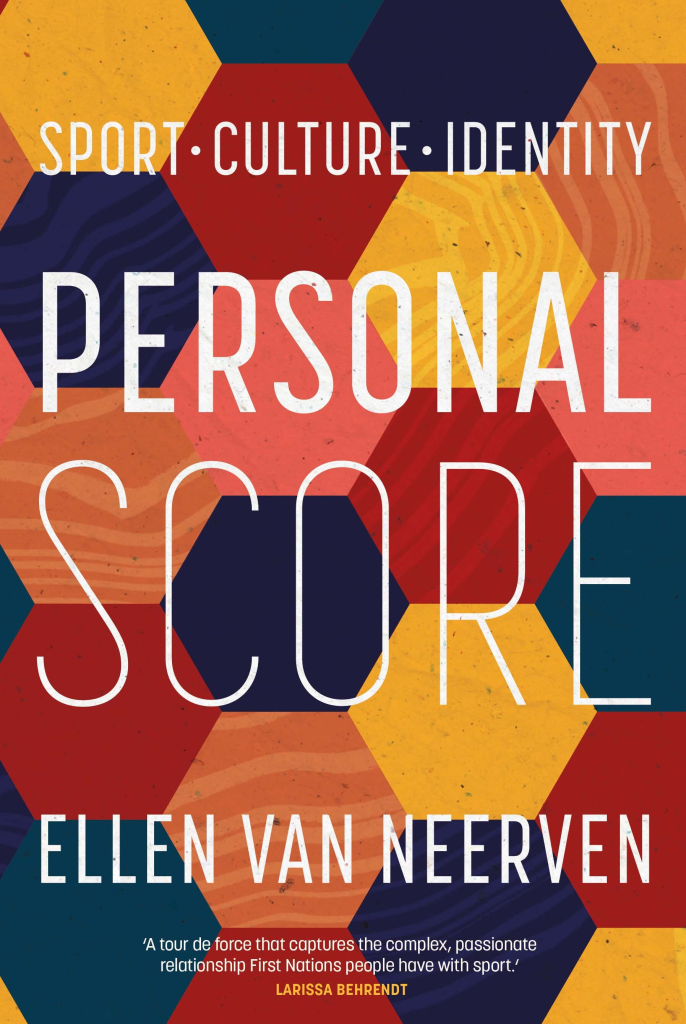
In 2023, the Women’s World Cup brought football to Australia like never before. For Ellen van Neerven, the ‘beautiful game’ is a focal point. In Personal Score, they blend memoir, history, and poetry to explore what it means to play sport on First Nations Land.
As van Neerven sees it, the oldest living sporting culture is about working with community and country – in stark contrast to the competition and conquest inherent in non-Indigenous sport. Van Neerven describes the long tradition of sport before colonisation: games such as Woggabaliri, played by Wiradjuri people in NSW, where players do not take sides, instead working together to keep a possum-fur ball aloft.
For van Neerven, a player from a young age, sport is a contradiction: ‘real sport is dirty and complicated’. From the vilification of black players to the weaponisation of trans kids, racism and queerphobia are regularly laid bare on the pitch. At the same time, sport is a powerful force for community, empowerment, and change. Van Neerven makes clear that protest and sport go hand in hand. But sport also has a major role in kinship – ‘playing a part in a modern-day corroboree’.
Van Neerven’s love of the game is contagious. The ball is ‘soft and ready’ at their feet. Nail-biting games and last-minute wins punctuate their analysis and story.
Personal Score is remarkable in its breadth. While sport is their touchstone, van Neerven highlights the disproportionate impact of a changing climate on Indigenous people, the importance to Aboriginal health of story and being heard, and the complexity of gender and belonging, on and off the field.
A new and transformative piece of sports writing, Personal Score is an essential read for anyone wanting to better understand sport, community, and power on sovereign land.
The Careless State: Reforming Australia’s Social Services
By Mark Considine
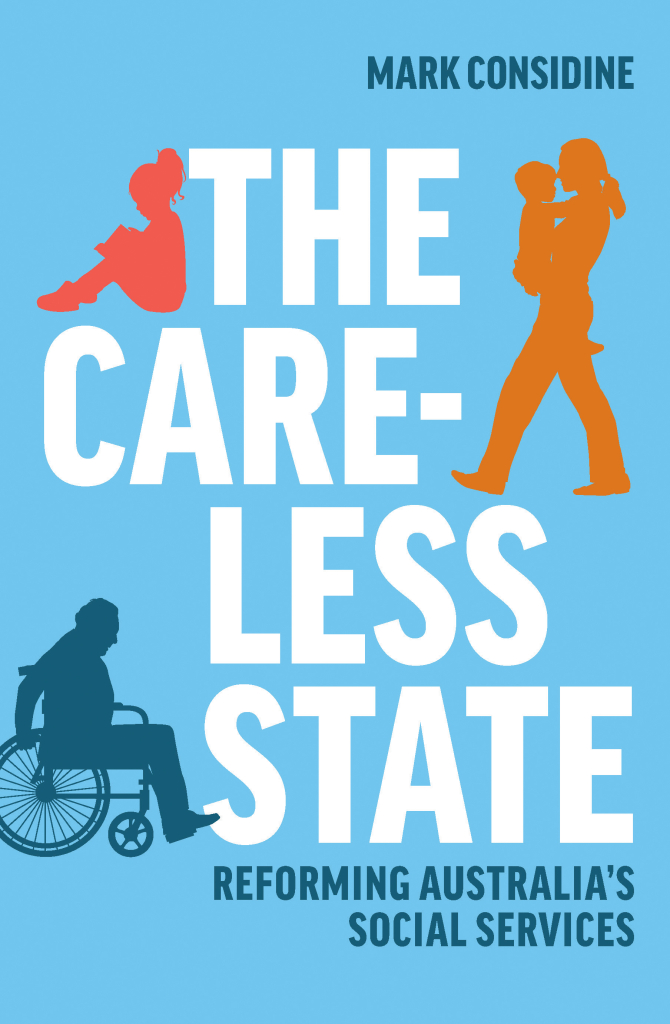
A seemingly endless stream of inquiries has made clear that Australia’s social services are doing a bad job of looking after people, while forcing taxpayers to fund burgeoning – and often fraudulent – costs.
Mark Considine, a professor at the University of Melbourne, impressively summarises the problems, explains how we got here, and shows that what may seem like separate problems have many shared roots. Readers will probably feel a sense of déjà vu moving through the chapters.
Considine points to a shift beginning in the 1980s, when successive governments began retreating from providing services directly, instead allowing private providers to compete to delivers services.
Many believed this market-based delivery system would lead to miraculous results: services could be more dynamic without the weight of bureaucracy, clients would be the arbiters of quality because they could switch providers, and competition would drive down costs.
But Considine’s analysis shows that this experiment has failed. Limited information or alternatives has made choice illusory. Governments have lost the ability to effectively regulate or contain costs, because providers need to protect their ‘secret recipes’. And not-for-profit providers with a longstanding focus on providing quality services have shrunk, unable to compete with the ruthless cost-cutting of private providers.
Three case studies – the NDIS, maternal health, and worker health and safety – suggest a better way. Rather than the illusion of choice, vulnerable people need specialists to advocate for them. Transparency should replace secret recipes, so that providers can learn from each other, and governments can genuinely regulate quality and manage costs. And governments need to take responsibility and run these programs as the public services that they are.
Considine’s timely account is essential reading for anyone concerned about the state of Australia’s social services, and anyone who wants to fix them.
Lifeboat: Disability, Humanity, and the NDIS
By Micheline Lee
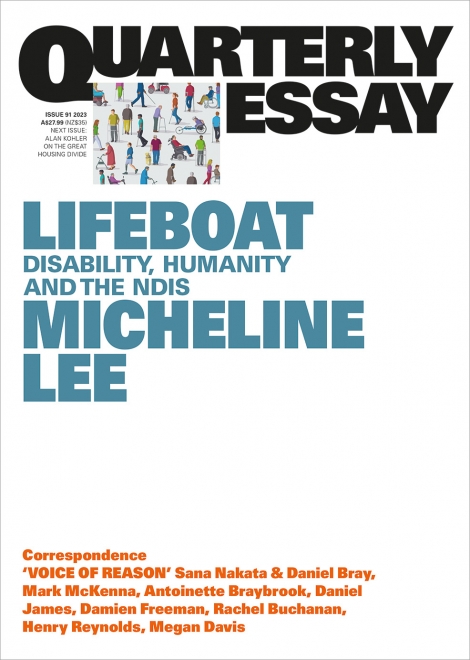
In Lifeboat: Disability, Humanity, and the NDIS, Micheline Lee gives moving glimpses into her life as an Australian with disability. The theory of disability policy, cerebral discussions of insurance schemes, and debates about discrimination turn into real-life, embodied experiences, set alongside Lee’s engaging analysis of the NDIS and its challenges.
Lee describes how the NDIS’s disempowering, confusing, and bureaucratic processes have worn out the trust of people with disability and their families.
But reining in the costs, making the services market fairer and more efficient, and looking beyond the NDIS to create an inclusive society seem a near-impossible set of tasks. The reader gradually realises that the NDIS has become the only lifeboat, and it can’t sink.
Even while pointing out the challenges facing the NDIS and people with disability, there is a warming tone of optimism running through Lee’s analysis. You feel it most in her kind disposition towards the people she meets, from the well-intended but wincingly ham-fisted shopkeeper, to the local people with disabilities pushing to be part of society at the swimming pool.
Lee offers her own experiences of her disability, countering the assumption that her life deteriorates as her motor-neurone disease worsens. It’s so clear you could graph it: there’s no correlation between severity of disability and quality of life. And yet this assumption is pervasive, leading many to question if spending money on services for people with disabilities represents value for taxpayers.
Lifeboat caters to all; if you don’t know what the NDIS is and why people need its services, you’ll have many of these questions answered; if you’re a person with disability, you’ll relate to the real-life experiences Lee describes; and if you’re a policymaker debating the future of the NDIS, you’ll encounter the human experience of policy in the lives of disabled Australians.
Recoding America: Why government is failing in the digital age and how we can do better
By Jennifer Pahlka
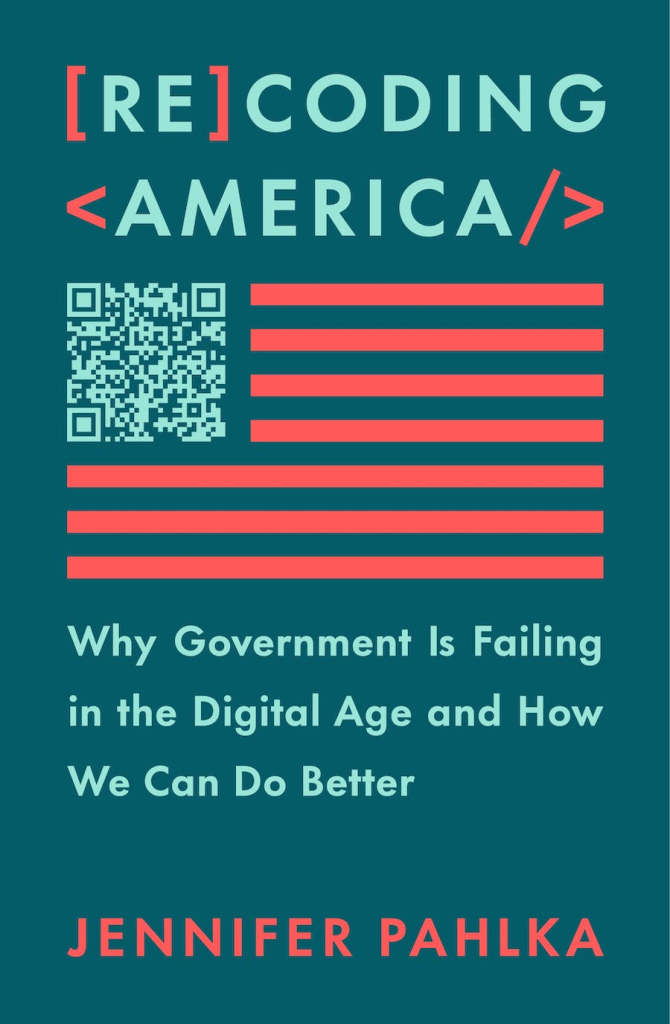
Technology is the front door to many government services. Whether it’s applying for a Centrelink payment, paying the rates bill, or claiming a Medicare rebate, we routinely engage with governments online. But too often, the design of online services is an afterthought, and users are left to grapple with lengthy, confusing, and duplicative processes.
In Recoding America, Jennifer Pahlka argues that the problem goes much deeper than the passing annoyance of a clunky form. Time and compliance costs add up across the population, chewing up resources that could be put to more productive purposes (or fun!).
Worse still, bad design can entrench inequalities. When you need a fixed address, the latest web browser, or a lawyer to get services you’re legally entitled to, people already on the margins are at risk of being left further behind.
The book draws heavily on Pahlka’s experience founding a not-for-profit organisation that works with state and local governments in the United States to make digital services more accessible. But while the case studies are American, the policy principles are universal.
Pahlka argues that services should be designed to accommodate the needs of users, not governments. This means simplifying language and policy rules where possible, and ensuring there are feedback loops from users and frontline workers to policy makers up the chain. Ultimately, this requires shifts in the mindset of politicians and public servants: less risk aversion and disdain for the nuts and bolts of service provision, more empathy for users, and a greater willingness to try new approaches.
Recoding America is a compelling call to arms for better design and delivery of government services. After reading it, you’ll never look at a web form in quite the same way again.
Ravenous: How to get ourselves and our planet into shape
By Henry Dimbleby and Jemima Lewis
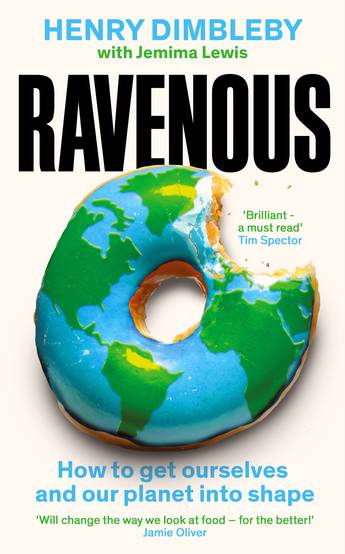
Australia has an obesity problem. We are getting heavier, the foods we eat are making us sicker, and the ways we produce them are taking a toll on our environment.
There’s no shortage of books, films, and fads announcing this problem, but few go searching for the crux of the problem.
Ravenous is more ambitious. It invites readers on the journey that led us here. It explores the complex machinations of modern food systems. And it details how our food choices are influenced by the industries that make our food, and the environment that surrounds us.
Ravenous shows how our decisions about what foods to put in our shopping baskets are subtly but constantly influenced by a vast food system. The consequences are rarely good for us, our health, or our planet.
The book is written from a UK perspective, but the lesson applies equally to Australia: governments have failed to protect consumers from the harms of modern-day food systems.
It might be confronting for some of us to hear that our food choices are steered by outside factors. But it will come as no surprise for those who struggle with their diet, weight, and health. These challenges don’t emerge because of a personal failure or lack of will, but because eating healthy is an uphill battle.
If our food choices were purely down to the individual, how is it possible that millions of us across the world are facing the same issues with diet and obesity, all at the same time? Is it simply not plausible that there has been a simultaneous crash in our sense of personal responsibility, or that we’ve suddenly started caring less about our weight and health.
Ravenous is a fast paced, well-evidenced call for a healthier, more sustainable food system. We should devour it.